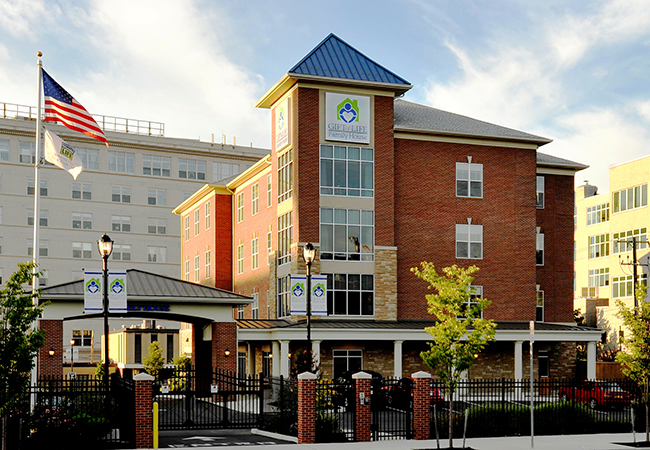Dr. Brian Nguyen (left) and Dr. Daniel Choi (right), a second year resident, testing out the new mask.
By Kristen Mulvihill
Scheie Vision Summer 2021
In the fall of 2020, Ranjoo Prasad, OD, Director of the Penn Center for Low Vision Rehabilitation, and Brian Nguyen, MD, first year ophthalmology resident, received Penn Medicine CAREs grants for two community-related projects.
The Penn Medicine CAREs Grant program provides institutional support each year to faculty, staff, and trainees who volunteer their time to serve the community. CAREs grant recipients exemplify the values of Penn Medicine and its commitment to make an impact through various service initiatives. Now more than ever, these initiatives are critical to provide support to vulnerable populations during the COVID-19 pandemic.
In collaboration with the Gift of Life Family House (GOLFH), Dr. Prasad is supporting a temporary transportation initiative to allow for continued access to specialty care during the pandemic. GOLFH is a hospitality house for transplant patients and their families who travel to Philadelphia for care. The Family House provides home-like accommodations and supportive services, including meals, activities, and transportation to hospitals for medical care. Though the Family House has remained open during the pandemic, the volunteer-led shuttle program was temporarily halted due to restrictions.
“Providing transportation enabled residents not to worry about navigation in an unknown city and relieved the additional burden of costs for gas, parking, and other means of transport,” explained Dr. Prasad, who currently serves on the Advisory Board of GOLFH.
To address this shortcoming, the Family House has been subsidizing the costs for ride-share programs, such as Uber and Lyft. Support from this CAREs grant will continue to offset the ride-share costs and allow patients and their families to access appointments and care during the pandemic. As of March 2021, 485 trips were provided at no charge to guests of the Family House.
“My family had a very young member who had a transplant more than 12 years ago, and we stayed at a similar facility that provided a shuttle service,” Dr. Prasad said. “I completely understand the need and importance to support the access for patients and their families during COVID-19.”
Similarly seeking to fulfill needs created by the pandemic, Dr. Nguyen launched an initiative to make and distribute comfortable personal protective equipment. Despite the efficacy of face masks, some studies show that masks with elastic ear bands are uncomfortable and may cause pressure injury and headaches. This may result in a decline in compliance. Surgical masks used in the OR have ties instead of bands, making them more comfortable; however, Dr. Nguyen recognized that these masks were not readily available to the public.
In response, Dr. Nguyen made customizable 3D-printed bands that redistribute ear pressure to external hooks on the mask. After trialing some of the National Institutes of Health (NIH) templates of mask attachments, he printed out prototypes at the 3D printing lab at the University of Pennsylvania’s Biomedical Library and selected the best design. He printed 100 attachments and initiated a pilot study at Scheie, finding that the hook attachment led to an 80% increase in mask utilization.
To date, Dr. Nguyen has distributed over 500 of these ear savers to vulnerable patient populations at the United Community Clinic. “I wanted to indirectly increase mask usage, especially amongst those in the community who were more likely to have worse health outcomes, such as those who were socioeconomically disadvantaged,” he said.

The Gift of Life Family House.